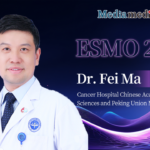
From September 13 to 17, 2024, the highly anticipated European Society for Medical Oncology (ESMO) Annual Meeting took place in Barcelona, Spain. At this prestigious event, three cutting-edge research projects led by Dr. Lin Shen from Peking Cancer Hospital were successfully selected for poster presentations, showcasing the remarkable contributions of Chinese scholars in the field of oncology. Dr. Lin Shen has always emphasized the importance of designing clinical research to solve practical clinical problems, and these three studies exemplify that scientific spirit in action. Oncology Frontier has meticulously compiled the core content of these posters to present readers with an academic feast and to share the latest advancements in oncology.What’s Next for Heavily Pre-Treated Patients with Advanced HER2-Positive Solid Tumors?
675P – Evaluation of the safety and efficacy of JSKN003 in patients with advanced HER2-positive (IHC 3+) solid tumors (excluding breast cancer)
JSKN003 is a novel HER2 bispecific antibody-drug conjugate (ADC) that combines a humanized bispecific antibody with a topoisomerase I inhibitor. In the JSKN003-101 and JSKN003-102 studies conducted in Australia and China, 24 patients with HER2-positive solid tumors were treated with JSKN003 monotherapy, with doses ranging from 2.1 mg/kg to 8.4 mg/kg. Most patients (83.3%) were still undergoing treatment, with a median treatment duration of 13.9 weeks. Treatment-related adverse events (AEs) occurred in 95.8% of patients, but most were Grade 1-2, while 20.8% of patients experienced Grade 3 or higher AEs, with no deaths or discontinuations due to AEs.
Among the 22 patients who underwent tumor assessments, the objective response rate (ORR) was 72.7%, and the disease control rate (DCR) was 95.5%. Notably, five patients who had previously received HER2-targeted ADC therapy had an ORR of 80%, with a median duration of response exceeding 30 weeks. These preliminary results suggest that JSKN003 has good tolerability and significant anti-tumor activity, supporting further clinical development.
How to Further Improve First-Line Treatment Outcomes in HER2-Negative Advanced Gastric/GEJ Adenocarcinoma?
1419P – Osemitamab (TST001) plus nivolumab and CAPOX as the first-line therapy for the patients with advanced G/GEJ cancer (TranStar102)
TST001 is a high-affinity monoclonal antibody targeting CLDN18.2, with enhanced ADCC effects. Preclinical studies have shown synergy between TST001 and anti-PD-1 antibodies and chemotherapy drugs. TranStar102 is a Phase I/IIa study evaluating the safety and efficacy of TST001 (3 mg/kg or 6 mg/kg, every three weeks) combined with nivolumab and CAPOX as first-line treatment in patients with gastric/gastroesophageal junction (G/GEJ) adenocarcinoma. As of April 18, 2024, 82 patients were enrolled, with a median follow-up of 12.6 months. All patients experienced treatment-related AEs, but most were Grade 1-2 and manageable.
In the CLDN18.2 high/intermediate expression group (n=32) and the PD-L1 CPS<5 subgroup (n=22), the progression-free survival (PFS) was 12.3 months and 12.6 months, respectively, with ORRs of 58.1% and 71.4%. The median duration of response was not reached. These results suggest that TST001 combined with nivolumab and CAPOX is a safe and well-tolerated first-line treatment with significant anti-tumor activity, particularly in patients with high/intermediate CLDN18.2 expression.
What New Treatment Options Are Available for Patients After Immunotherapy Failure?
1410P – Efficacy of fruquintinib plus paclitaxel (F+PTX) in patients (pts) with prior immunotherapy (prior-IO): Subgroup analysis from FRUTIGA study
The FRUTIGA study demonstrated that the F+PTX regimen significantly improved PFS, ORR, and DCR in second-line treatment of advanced G/GEJ adenocarcinoma. In this analysis, 82 patients previously treated with immunotherapy were further examined, with 35 receiving F+PTX and 47 receiving placebo+paclitaxel (PBO+PTX). Results showed that the F+PTX group had a median PFS of 6.4 months compared to 1.8 months in the PBO+PTX group (HR=0.38; P=0.0003), with higher ORR and DCR (57.1% vs. 19.1% and 82.9% vs. 42.6%, respectively). Although overall survival (OS) did not show a statistically significant difference (median OS: 12.1 months vs. 10.3 months, HR=0.99), the F+PTX regimen demonstrated similar benefits in the prior immunotherapy group as in the intention-to-treat (ITT) population and may further reduce the risk of death or disease progression. Therefore, F+PTX offers significant clinical value in patients previously treated with immunotherapy.
Dr. Lin Shen
- Position: Director of the Department of Gastrointestinal Oncology, Director of Phase I Clinical Trials Unit, Peking Cancer Hospital
- Former Roles: Vice President of Peking Cancer Hospital, Deputy Director of Beijing Cancer Research Institute
- Titles: Beijing Scholar, Chairperson of the Cancer Precision Therapy Committee of the China Anti-Cancer Association (CACA), Founding Chairperson of the Oncology Drug Clinical Research Committee of CACA, Chairperson of the Clinical Research Expert Committee of the Chinese Society of Clinical Oncology (CSCO), Chair-Elect of the CSCO Gastric Cancer Expert Committee, and Vice Chairperson of the Colorectal Cancer Committee of CACA and the Chinese Medical Women’s Association Clinical Oncology Committee.


